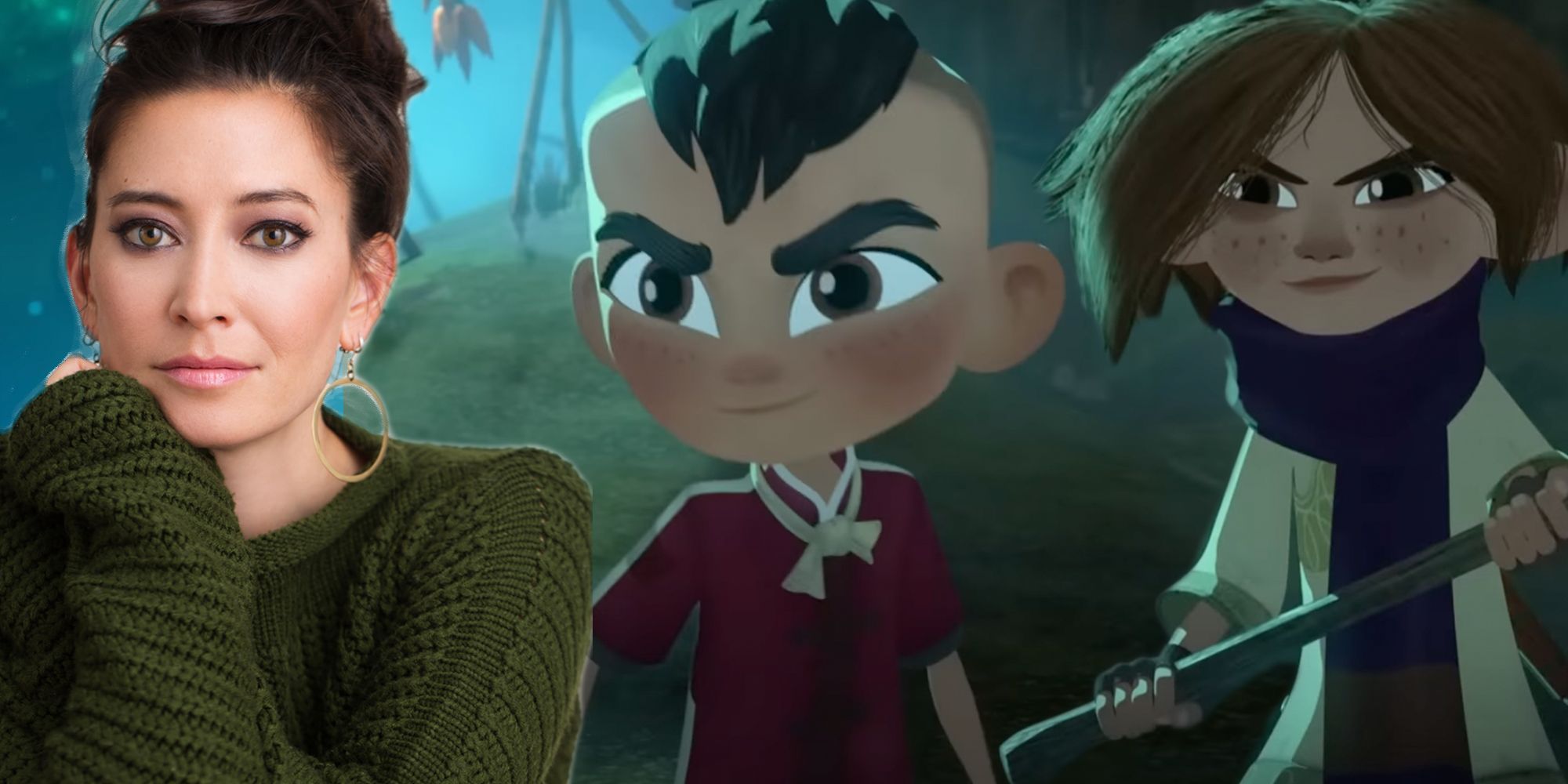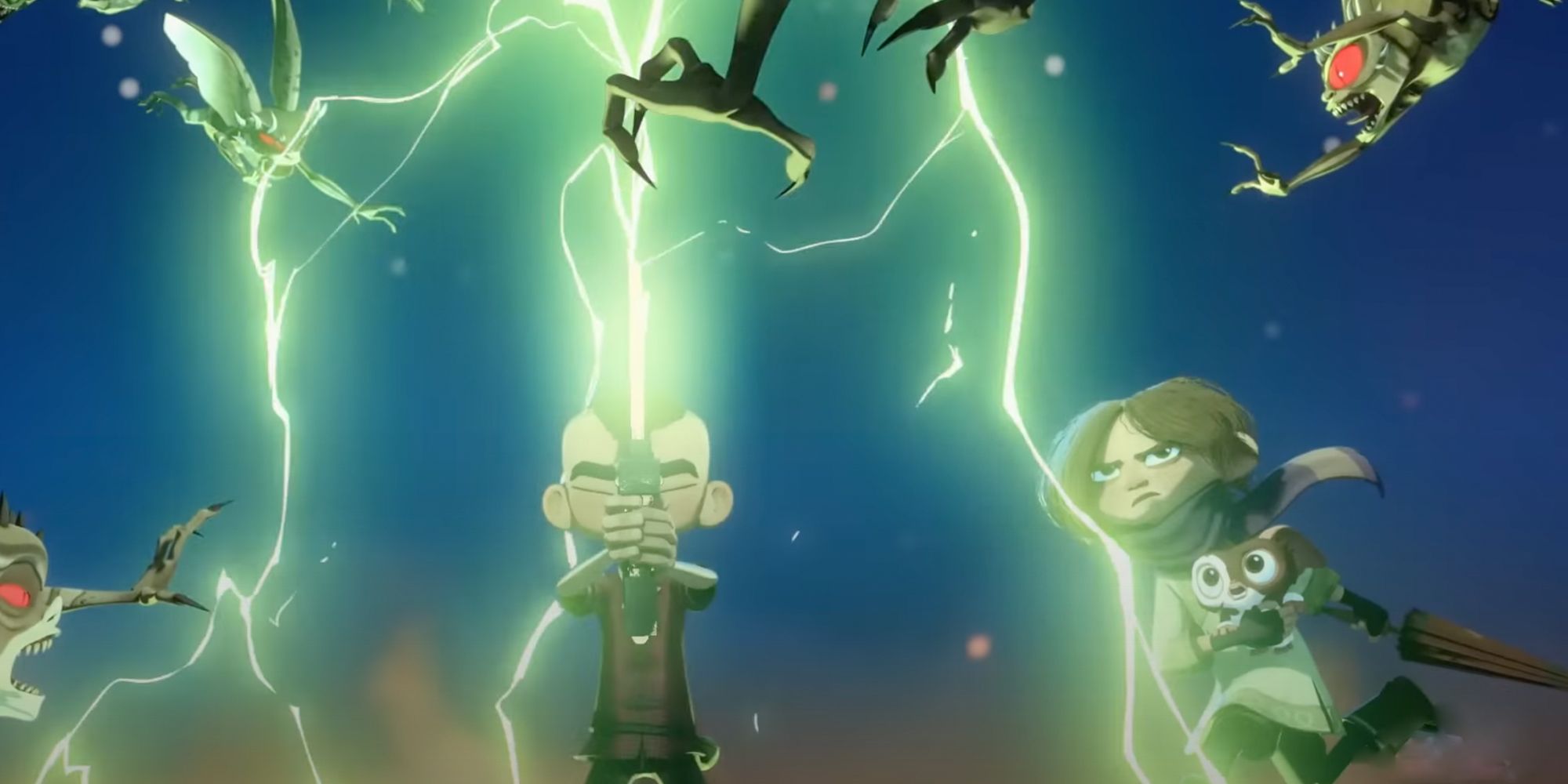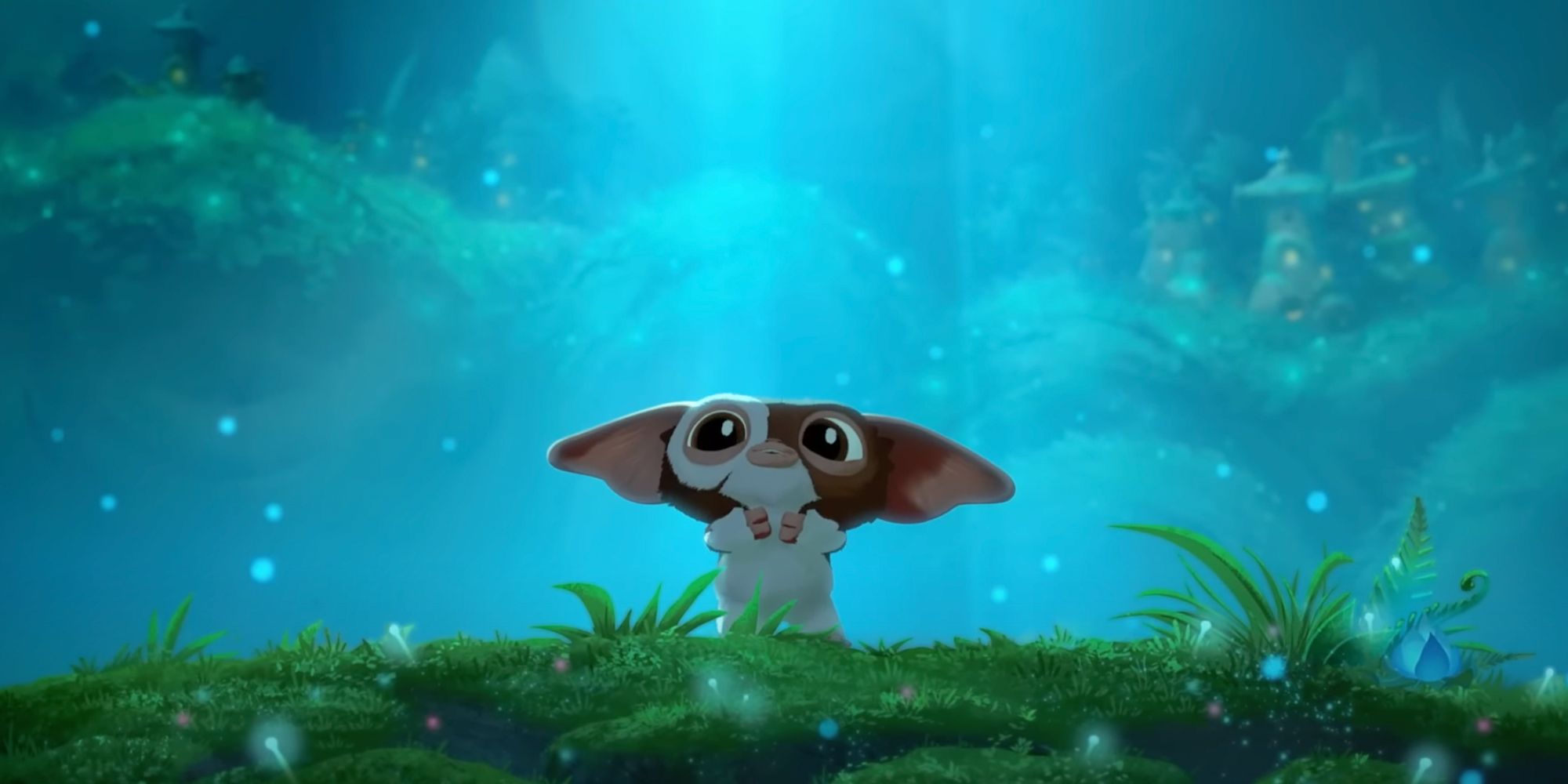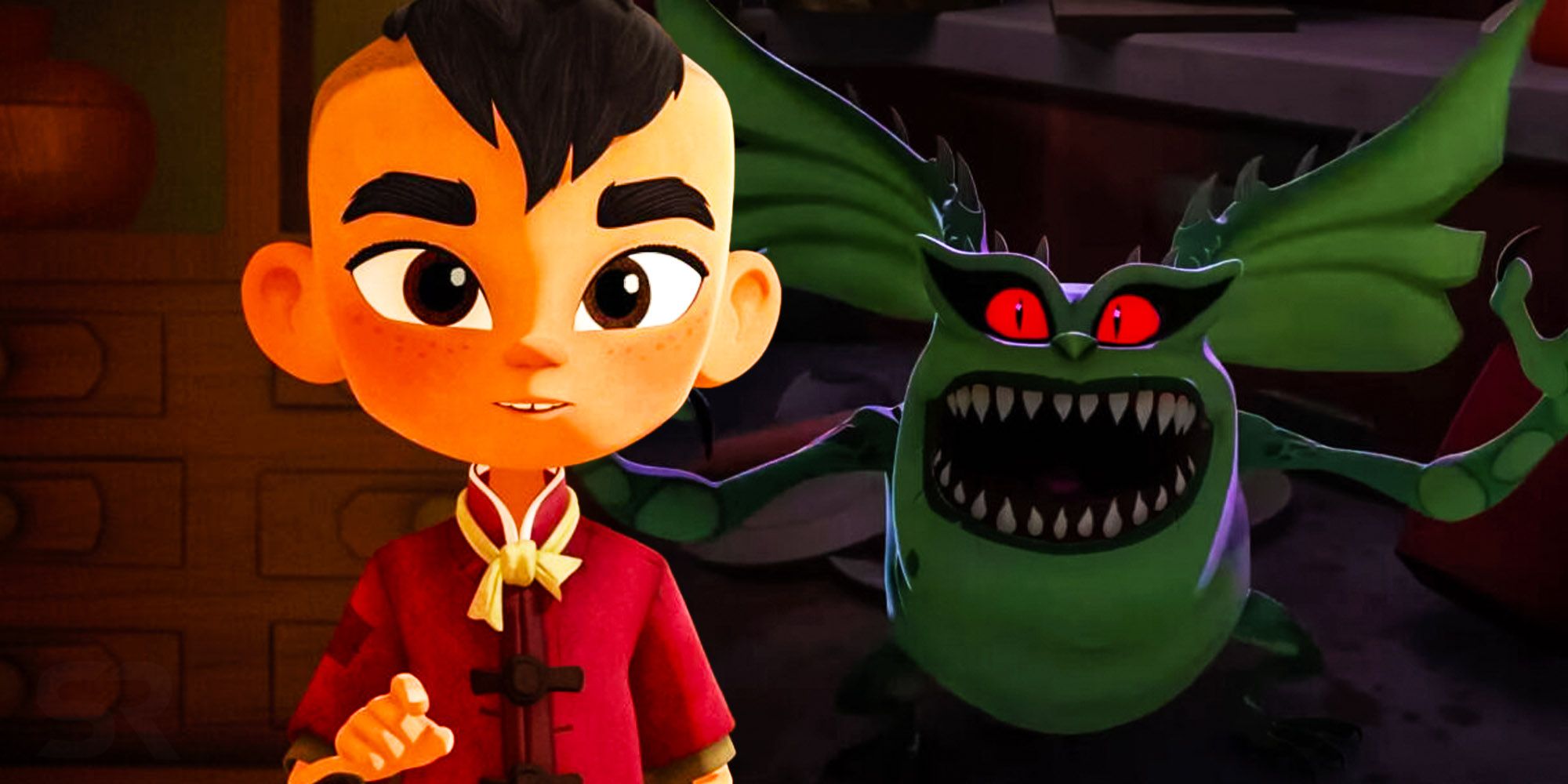Gizmo is back in Gremlins: Secrets of the Mogwai, the new Max series that serves as a prequel to the hit 1984 film Gremlins. Although only a few episodes have been released thus far, reviews have praised the way in which Gremlins: Secrets of the Mogwai successfully captures the unique tone that made the original film a hit. In addition, Gremlins: Secrets of the Mogwai offers a close look into the mythology of its unique world, greatly expanding what audiences know about the Mogwai and even introducing new mystical and rare creatures.
Music for the original Gremlins film was written by legendary composer Jerry Goldsmith, whose work lives on in the work Sherri Chung has done on the animated series. A prolific composer in her own right (Chung has scored all of Riverdale, Kung Fu, and Batwoman), Chung has also put her own stamp on the musical landscape of Gremlins. By augmenting orchestral writing with instruments from the series’ location and time period—1920s Shanghai—Chung has crafted a score that harkens back to Goldsmith’s iconic original while also finding its own compelling identity.
Sherri Chung spoke with Screen Rant about stepping into the world of Gremlins, the end of Riverdale, and more.
Sherri Chung on Gremlins: Secrets of the Mogwai
Screen Rant: Gremlins already kind of had a musical landscape thanks to Jerry Goldsmith's music for the film. Was there a biggest surprise, or emotion, or challenge you discovered in working with what he had already done and incorporating it into this show?
Sherri Chung: The initial conversations about the music [touched on that]. I said there's a little bit of an 80's synth going on with the first one, but there's a lot of orchestral music [too]. We talked about options for that, and what was cool is that the producers were like "Let's lean into that." They were really open to my ideas, which was really amazing.
They obviously wanted to incorporate Jerry Goldsmith's themes, so fans will hear "Gizmo's Lullaby" in there, [and] obviously "The Gremlin Rag" is the main title and end credits, but the biggest thing they said for musical direction was they wanted to push the emotion. [They wanted to push not just] the heartfelt emotion, but the other emotions as well about Sam's journey--his fear, his guilt, the darkness. There's a lot of darkness in there, even in the first couple of episodes. Greene is really dark, and [the music] plays into a lot of the fear, and panic, and nightmare aspects.
They really wanted to push the emotion, and so I did lean more towards orchestral as opposed to the '80s synth. It was also set in 1920 in Shanghai, so that's not really '80s synth. These were all the conversations [we had] at the very beginning, and I would say it was a really amazing creative journey to create a world within the orchestral realm [while] also pulling in Jerry Goldsmith themes and pushing the emotion of the whole thing.
I know you've done at least a little bit of animation work before; in terms of, like you were saying, diving into the emotions, do you have to think about scoring differently for an animated show?
Sherri Chung: It's funny. I don't have much experience in animation; not in this kind of animation. I did other animation, more of an avant-garde type of thing. I would say that the function of score, at least in this show--I don't want to speak for all animation; I don't know--[is that] there's a lot more responsibility in some ways to complete the sentences that you're hearing and seeing on screen. I'm not saying to help the scenes along; it's just to sort of complete the circuit, almost. "This is happening, and the music is really going hand-in-hand for a lot of that."
I've found that to be the case with a lot of live-action that I've done, but not in the same way. [Animation] is a lot more hand-in-hand. It's really in lockstep with what you're seeing, because there are a lot of things that aren't necessarily conveyed as much in animation, given, like, the facial expressions. [That] is not to say that there's no subtlety or nuance in the acting and in the animation. There certainly is, but there's a weightier responsibility, I think, to the score. I would say it almost has to work a little bit harder in some ways than some of the live-action that I have experience with, but there's definitely room to back away and let that moment sink in, and we talked a lot about that, too.
I had the opportunity to talk to your producers Tze Chun, Brendan Hay, and Joe Dante, and one of the big things they talked about was how important it was to get the tone right. Gremlins is scary but also funny. How was it to try and match that as a composer? Was it a challenge?
Sherri Chung: It was kind of fun. It was creatively challenging, but it was creatively fulfilling in that way because it's fun to figure out those puzzles. It's interesting because there were even times in a couple of these episodes where there was an onscreen bad thing happening in terms of violence. There's actually violence that we're at least alluding to, very much so, and there were a couple of times when I was like, "Do you want me to pull back? Do you want me to hold back here?" and they're like "No. Go. Go forward. Go into it." I'm like, "Okay, here we go."
But I feel like, if you think about it, that's very much the Amblin way--having these children in these very grown-up, mature situations, and taking it seriously. They're just throwing a kid into the wild of adventure, and discovery, and that kind of thing. I think it's the Amblin way to play it like, "Yeah, these are adults," or "These are mature beings that are experiencing these things." It becomes very immersive in that way, and I feel like that's what's exciting about it. I would say that it didn't become a challenge. In fact, if anything, it became this fun playground because I didn't have to ride this line of, "Don't want to do this, but don't want to do that."
It did tonally have to take a journey, and [I had] to figure out, "Well, what is that sound?" because it is in animation, and it is a mythical creature. I guess the creative challenge would have been to figure out, "How do we ground this in something that's very real to an audience? [Something that's] very real, but also doesn't take itself so seriously [that] we forget this world that's already been created by Joe Dante, Jerry Goldsmith, Amblin, and Steven Spielberg?"
I noticed some of the music does step away from a traditional Western film score feel. Were there instruments that you were excited to bring in, or cues that you were excited to branch out with?
Sherri Chung: One [instrument] in particular was the erhu which is a two-stringed bowed instrument that's akin to our Western violin. I worked with this amazing erhu player Karen Han. She had to teach me, basically, how to write for the instrument. It was a beautiful instrument because it's kind of versatile, but it [also] has a really distinctive sound. It's very, very distinctive. There was a lot of that peppered throughout the score because I think it helped to bring a more authentic feel. But also [Karen was] playing it in a more Western way. I would say that harmonically it wasn't always leaning into the Chinese sound, but sometimes I would lean into it, too.
There's another instrument, the guzheng. It looks like a dobro, almost, but it's plucked, and has tremolo. [I also used] some bamboo flutes [and] some Chinese percussion, but the erhu is probably the bigger emotional one that was [used] to bring us into more of a time and a place.
If you are working with an instrument like that, that you haven't worked with a ton in the past, do you start out by talking to a player and talking about what the instrument can do and can't do?
Sherri Chung: For this, and for any instrument that I really don't know, I do a combination of things. I will generally find a sampled version of it, a computer-generated thing, because I'm influenced by sound. Sometimes I'll write things on the piano and then move it to the orchestra, but for something very specific like this, I need to play with the sound of it. That said, samples are just samples. A live player will say, "Yeah, that's not really possible," or, "It's better if you write it this way," or "This range is better." So it's a combination of that and then having the conversation with, in this case, Karen.
We actually Zoomed because it was during the pandemic, and she sent me a bunch of links to amazing performances, not just by her but of other erhu players. I had to learn, also, that every erhu player has their own sensibility. It's a very different performance. In recording sessions we say, "That's a great take," but in Karen's recording sessions, I would say, "That's a beautiful performance." To me, the vocabulary changes when you work with an instrumentalist that is an expert in their field and is a specialist.
Do you have a specific moment that you were very excited about in terms of what you were able to bring musically?
Sherri Chung: There was one; I'll go right to the beginning, to the opening. The opening is so daunting because it sets the tone for everything. There's the Valley of Jade, so we're seeing where the Mogwai come from for the very first time. You have all that scope, you're doing all these aerial shots, you're going into a deep dive into this valley, and you open up in his mystical world, and there are all the cutest little Mogwai you've ever seen, and then they're going sing "Gizmo's Lullaby", and I'm like, "I'm dead. I'm dead."
You had/have two shows you've worked on for a long time ending this year, with Kung Fu and Riverdale both coming to a close. I imagine it's hard to have one even long-running thing end. How has this all been for you?
Sherri Chung: It feels like the end of an era, almost, but also in a good way. I feel like things do need to end. I've definitely shed some tears, but [everything] needs to end, and then it kind of gives way and paves way for new things coming up, and there are new things coming up. Gremlins season 2 has been greenlit and it's in production, so that's very exciting. It kind of feels like the end of an era but it also feels like a good way to mark time.
It's fun to look back and see the start of Riverdale seven years ago. We haven't finished this last season yet, it's obviously still airing, but it's kind of fun to see the full-circle nature of everything. [With] Kung Fu, it was definitely sad to see that one go so soon. I felt like we had a little more life in us, but I do think that the show wrapped it up really, really well, that the writing was really great, and Christina and Bob did a great job. But it's interesting.
I've had other shows last for five years and then end, so it seems like it's part of life and the art and industry of it. I'm pretty grateful because a lot of those have run for a while. It's harder [with] the one-season ones; you get really invested in it, emotionally, because you're creating something for it. So it's actually fulfilling if it gets as long run as Riverdale. It always feels like borrowed time anyway.
You mentioned Gremlins coming back for another season, but is there anything else you have coming out that you're excited about?
Sherri Chung: There have actually been a few things. I feel like I've been in my hidey-hole working, and all of a sudden things are coming out. I've got a show coming out on Peacock called Based on a True Story. That's actually dropping on June 8th, so it's actually quite hot on the heels of Gremlins. And there's a Netflix movie that I did called Happiness for Beginners. It was directed by Vicky Wight, and it's based on a book by Katherine Center, who also wrote The Lost Husband, which is another film that I got to do a couple of years ago. Then in the fall, there's a new show called Found coming out on NBC, and that one I'm pretty excited about as well. It's got some great, great writing, [and] great characters. It's all really exciting because everything's very different. It was all fun to work on.
About Gremlins: Secrets of the Mogwai
“Gremlins: Secrets of the Mogwai” takes viewers back to 1920s Shanghai where the Wing family first meets the young Mogwai called Gizmo (AJ LoCascio). Voiced by Izaac Wang, Sam Wing (future shop owner Mr. Wing in the 1984 “Gremlins” film) accepts the dangerous task to take Gizmo home and embarks on a journey through the Chinese countryside. Sam and Gizmo are joined by a teenage street thief named Elle (Gabrielle Nevaeh), and together, they encounter—and sometimes battle—colorful monsters and spirits from Chinese folklore.
Check out our other Gremlins: Secrets of the Mogwai interviews:
- Izaac Wang, AJ LoCasio, and Gabrielle Nevaeh
- Ming-Na Wen, BD Wong, and James Hong
- Tze Chun, Brendan Hay, and Joe Dante
Gremlins: Secrets of the Mogwai premiered May 23rd on Max, with new episodes to be released weekly.




